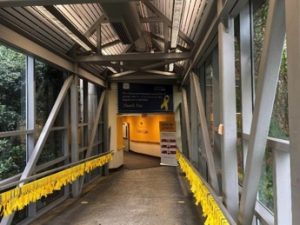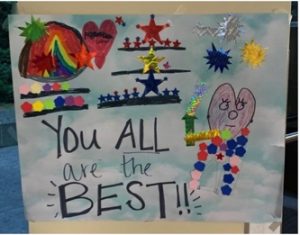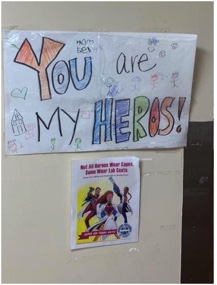What COVID Has Done For Me Lately
 On July 6, I started my job as the Wake Forest Baptist Medical Center fellow. To get to my office, you have to navigate the hospital’s labyrinthine hallways, starting at the sky bridge and ending at the elevator on the far side of the hospital. The walk is long and usually fills half of my exercise ring for the day, but it’s also the most scenic walk in the hospital.
On July 6, I started my job as the Wake Forest Baptist Medical Center fellow. To get to my office, you have to navigate the hospital’s labyrinthine hallways, starting at the sky bridge and ending at the elevator on the far side of the hospital. The walk is long and usually fills half of my exercise ring for the day, but it’s also the most scenic walk in the hospital.
The sky bridge, or Victory Lane, is triumphantly decorated with yellow ribbons. It’s the first thing each employee sees in the morning and the last thing they see when they leave in the afternoon. Each ribbon represents one COVID patient that our local healthcare heroes could save. On my first day of work, there were already thousands of ribbons lining the sky bridge. Throughout the hallways, posters from the local elementary and middle schools hang in plain sight. “YOU ALL ARE THE BEST!!!” one sign screams, speckled in hearts, stars and flowers. “You are my heros!” another gratefully says with the young artists’ signatures lining the poster. My favorite is a graphically designed lab technician in a white coat and a cape, resembling a superhero.
These messages aren’t anything new—in fact, they’re most likely remnants from the first few weeks of the pandemic in 2020, perhaps the last time we were nationally unified in defeating this virus and ce lebrating the healthcare workers fighting the war. But the ribbons feel different. In the past two weeks, things have felt a lot more like March 2020 than May 2021. This pandemic isn’t quitting yet, and neither are its personal effects: a strain on mental health and academic performance; heightened feelings of anxiety, social isolation, and pandemic fatigue. We cannot keep living like this, but the circumstances seem entirely out of our hands—so, what do we do? We reflect and celebrate our victories, big and small.
lebrating the healthcare workers fighting the war. But the ribbons feel different. In the past two weeks, things have felt a lot more like March 2020 than May 2021. This pandemic isn’t quitting yet, and neither are its personal effects: a strain on mental health and academic performance; heightened feelings of anxiety, social isolation, and pandemic fatigue. We cannot keep living like this, but the circumstances seem entirely out of our hands—so, what do we do? We reflect and celebrate our victories, big and small.
I’ve talked in-depth about the pandemic with Dr. Julie Freischlag, the CEO of Wake Forest Baptist Medical Center and Dean of Wake Forest School of Medicine. Of course, there is plenty of loss to discuss—patients we could not save and healthcare workers who are burning out along the way. However, she says that she also keeps a Word document on her computer with a running list of “all the good things COVID has done for [her] lately.” “It’s a short list, I won’t lie,” she jokes, but it’s important to reflect on the positives in life, especially in tough times. She talks about how the pandemic forced us to learn to meet online, which helped bring alumni together from across the country who previously couldn’t meet in Winston Salem for reunions. We identified gaps in optimizing our clinical space. By making interview season virtual at the medical school, applicants cut travel-associated costs to Winston Salem, resulting in the largest applicant pool in the school’s history and the recruitment of one of our most diverse medical school classes ever. Perhaps most of all, the pandemic shined a light on health disparities among communities of color—a light so bright that we can never cast it into the shadows again. The hospital has coordinated a Racial Equity Task Force to address healthcare accessibility and racial equity in our patient care, education, community, and workplace culture.
 None of these have been small victories. It would be so easy for us to see the negativity as it happens and embody it. It’s a lot harder to reflect and positively reframe your pandemic experience, but I promise you, it’s worth it. You’ve learned a lot this year about yourself and others (not to mention infectious disease). What I’m asking you to do now, as you start your college career, is to reflect on what you’ve actually learned about yourself and positively reframe it. Start your college career motivated to address what you can to live a happier life, even in a pandemic. I asked a few friends to help by giving some examples of what they thought they learned and how to positively reframe what they actually learned:
None of these have been small victories. It would be so easy for us to see the negativity as it happens and embody it. It’s a lot harder to reflect and positively reframe your pandemic experience, but I promise you, it’s worth it. You’ve learned a lot this year about yourself and others (not to mention infectious disease). What I’m asking you to do now, as you start your college career, is to reflect on what you’ve actually learned about yourself and positively reframe it. Start your college career motivated to address what you can to live a happier life, even in a pandemic. I asked a few friends to help by giving some examples of what they thought they learned and how to positively reframe what they actually learned:
1. No: “I learned that I hate my roommate.”
Yes: “I learned that I don’t like when my roommates leave their dishes in the sink or wake me up at 2 am playing loud music. When I make my roommate agreement with my next roommate, I’m going to make this extra clear to avoid any problems.”
2. No: “I spend way too much time on my phone.”
Yes: “I’m giving myself some grace because I am surviving a pandemic with limited opportunities to have hobbies outside my house. That’s why my screen time is so high now. I now have a reason to go explore some hobbies at the Student Activity Fair in the fall.”
3. No: “I need a routine, or I fall apart.”
Yes: “I learned that I work best with a routine, so I’m going to make one for the fall semester that gives me the best opportunity to be a whole person. However, I’m also going to acknowledge that sometimes I won’t be able to live exactly according to this schedule, and it doesn’t make me any less of a person.”
Those yellow ribbons feel different because they are the best example of a positive reframing I have seen since the pandemic began. Our healthcare workers are overworked and exhausted, now tending to what is becoming the fourth wave of infections. The hospital could easily choose to frame the pandemic in terms of what’s been lost and the strain felt, but instead, they choose to recognize the good that has come from it: the survival of thousands of patients who were previously fighting for their lives. As of August 4, over 2,470 patients had gone home to their families.
What has COVID done for me lately? It’s given me time to reflect on my values and why I do things. I noticed over quarantine that I missed some activities I was involved in, but I was glad to have an excuse not to participate in other activities. I realized I was involved in those organizations just so I could say that I was. I cut out of my life the things I was doing that weren’t interesting to me or making me a better person. Now, I’ve rediscovered time in my life to do the things I actually want to do.
I encourage all of you to practice positive reframing as you begin your college career. At the risk of sounding cheesy and ridiculously cliché, I believe that positivity is as contagious as this virus, but only one makes a campus that truly lives up to its values. You now make the culture of Wake Forest—bravely choose positivity in a time of such negativity. Make your college experience what you want it to be, and celebrate your successes when they go to plan! And along the way, don’t forget to stop and ask yourself, “what has COVID done for me lately?”
With Optimism and Faith,
Aidan Wiley
Fellow, Wake Forest Baptist Medical Center
